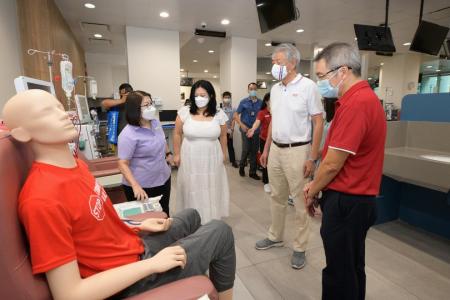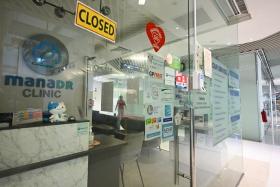Patients play their part in new Punggol dialysis centre
They learn to measure own vitals and even read dialysis machine data to understand their condition better
A new dialysis centre was officially launched in Punggol yesterday that will see its patients take responsibility for their dialysis sessions by measuring their own vitals and laying out medical supplies before starting treatment.
This self-responsibility has been shown to improve patients' health outcomes as they are involved in their own treatment, said the National Kidney Foundation (NKF), which runs the new centre at Oasis Terraces in Punggol.
The new initiative is called "in-centre self-care".
More active and mobile patients will monitor their blood pressure and blood sugar levels, and learn proper handwashing steps.
After the patient has opened and laid out the medical supplies, such as needles, alcohol swabs and saline solution, all the nurse has to do is insert the needles and cannula into the patient's arm and start the dialysis.
The new centre brings the total number of NKF dialysis centres islandwide to 39 and is the second largest after NKF's Integrated Renal Centre in Jurong West.
It is also the first dialysis centre to be located in a new-generation neighbourhood centre such as Oasis Terraces, which also houses Punggol Polyclinic opposite the centre.
Most other NKF centres are located at the void decks of Housing Board flats.
The centre has 35 dialysis stations and can take in up to 210 patients. It started operations in September 2019, with 208 patients receiving treatment there currently.
Initially planned for a mid-2020 launch, the official opening was postponed because of the Covid-19 pandemic.
Yesterday, Senior Minister Teo Chee Hean and Ms Yeo Wan Ling - both MPs for Pasir Ris-Punggol GRC - launched the new centre, which is named the NKF Dialysis Centre Supported by Ngiam Kia Hum & Family.
Mr Ngiam is the managing director of Haneflex Singapore, a company that supplies fuel-handling equipment, and has been a long-time donor with NKF.
DONATE
He started donating dialysis machines 15 years ago and wanted to help set up the new dialysis centre.
The in-centre self-care initiative was introduced at the centre last month. Currently, one patient has completed the training and five others have been identified to join the programme, said NKF.
After undergoing a 2½-hour training session with the centre's nurses, Madam Manisah Mohamad Salleh, 57, learnt to independently take her weight, measure her blood pressure, and remove medical equipment such as the cannula from its packaging in a sanitary manner.
Learning to read the data from her medical reports and dialysis machine helped her understand why she had to limit her fluid intake to one litre a day and watch out for rising or falling blood pressure, which can cause side effects or complications during dialysis.
Said the retired assistant childcare teacher, who has kidney failure: "I can be independent and I understand my condition better.
"It also helps to ease the nurses' workload, so they have time to focus on other duties."
Seriously ill or wheelchair-bound patients may not be eligible for the self-care programme, but the centre is planning to train their caregivers, said Madam Cheong Lay Tin, the Punggol centre's nurse manager.
The new programme will be progressively rolled out to other NKF dialysis centres, starting with those in the northern region.
Get The New Paper on your phone with the free TNP app. Download from the Apple App Store or Google Play Store now


